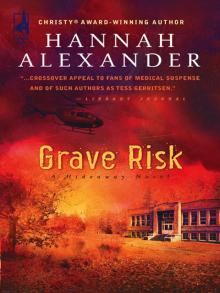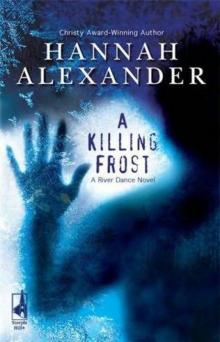- Home
- Hannah Alexander
Hideaway Home Page 2
Hideaway Home Read online
Page 2
Ivan nodded slowly. He swallowed and met Red’s gaze with a fierce stare. Then he looked down and swallowed again.
“We were landing on the beach,” he said, his voice so soft Red had to strain to hear. “Next thing I knew, the night sky seemed to explode all around us.”
Red winced. He knew what that meant.
“Five of my best buddies were killed before I could move.” The words seemed to spring from Ivan—fast, hard, his voice low—as if he’d been bottling them up inside.
Red studied his friend, but didn’t see any signs of damage, no Purple Heart. “But they didn’t get you.”
Ivan shook his head. “Sometimes I think it would’ve been better if I’d gotten a bullet, too.”
“No, it wouldn’t.” But Red understood.
Ivan glanced at Red, eyes narrowing. “What’s your worst memory?”
Red couldn’t tell him. He could probably never tell anybody. So he pulled out another recollection. “German soldiers surrounding our fire support team.”
The surprise didn’t show in Ivan’s eyes as much as it did in the sudden jutting of his strong chin—as if bracing himself for details. “You were captured.”
“It’s been a couple of months.” Even now, Red could picture in his mind the grim, white faces of his captors. He could feel the fear licking at his insides, almost feel the rough hands shoving him and Conner and Beall through fields of mud.
“When?” Ivan asked. “Why didn’t I hear about it? Bertie would have told me about it in a letter.” He looked at Red’s uniform for the first time. “Where are your medals?”
Red shrugged. “It don’t matter. I’m alive. Before word could be carried back home that we were prisoners of war, we escaped in the middle of the night.”
Ivan gave a low whistle. “If that doesn’t beat all.”
“Just in time, too. I got the impression, picking up on some of their words, that they’d planned to kill us soon.”
“You speak German?”
Red nodded. “I learned some words from my pa years ago. I hadn’t even realized I remembered them until I listened to our captors talking to one another. There were five of them and only three of us. I thought we were goners.”
“How’d you get away?”
Red shrugged. He couldn’t talk about the whole thing. “The fifth night, after a long day’s march, we got loose from our bonds.” He couldn’t go into more detail without explaining more than he wanted to.
Ivan waited, eyes slightly narrowed in confusion. “Just like that?”
Red nodded. He’d never thought much about the humanity of the enemy. That wasn’t something they talked about in the foxholes or on the scoutin’ trail. All they did in the foxholes was curse the enemy, and do everything they could to make sure he died.
The rattle-clack-rattle-clack of the train filled the silence for a few long moments as the two men sat steeping in the ugliness they’d seen.
“Don’t mention that bit about the massacre to my parents,” Ivan said softly. “Why worry them about something that’s already happened? They’ve worried enough about me in the past three years.”
“Reckon there’s lots our families are never gonna know about.”
“Sometimes it seems the farther I get from the war, the more I remember,” Ivan said.
Red knew what he meant. All that loud commotion clattered around in his mind, along with pictures of mangled or dead friends. He still felt the pain of his own wounds—both in his flesh and in his heart.
“Maybe we have to remember,” Ivan said. “A man’s got to stay on the alert.”
Red agreed, but he couldn’t help wondering if he was already going soft. Since he was a German by blood, he couldn’t hate his former countrymen.
It was hard not to hate them when he heard about all those concentration camps, the awful things they did to other human beings. Torture? Gas chambers? Trying to stamp out a whole race of people? Genocide, it was called. Devilish. Straight out of the pits of hell.
As the thoughts started tormenting him once again, Red did what he always did to take his mind from them. He patted his shirt pocket, thick with letters.
Ivan, of course, knew without asking what was in Red’s pocket. “You still writing to Bertie?”
Red grimaced. “She’s been doin’ most of the writing.” Especially the past few weeks.
His sweet Bertie had a heart as tender and beautiful as spring violets, a face to keep a man alive through the worst of war, and a voice as warm and spicy as hot apple cider.
But he couldn’t keep thinking like that…not about her bein’ his.
“That little gal had a regular letter campaign going, you know,” Ivan told him. “She had all her friends writing to me, and any time I’d mention a buddy who hadn’t received mail in a while, sure enough, in a week or so he’d get a note from some stranger out of Culver City, California. Our Bertie’s all spunk. If she was president, this whole war would already be won.”
Red felt a quick rush of pride. “She’s kept me going, that’s for sure.”
“How’s Miss Lilly been getting on without you?”
“You know Ma,” Red said. “She says she’s doin’ fine, but it’s hard to tell ’cause she never complains.”
Ivan chuckled. “Strong as a Missouri mule and the best cook in Hideaway.”
Red returned his attention to the scenery sliding past the window. Now that Ivan had brought up the subject, Red remembered that he had someone else to fret about.
Until he was called up, he’d helped his mother run the Meyer Guesthouse in Hideaway. It had been a family operation since his pa’s death.
Lilly Meyer never let on about how hard it was to keep the place going without Red’s help—but he knew business must’ve gone slack without him to serve as fishing guide, hunting guide and storyteller, along with all the other chores he’d done for her every day.
Fishing along the James River had been a popular sport among their best and wealthiest customers, many of whom returned to Lilly’s guesthouse year after year for the fishing. These guests had gotten the Meyers through the depression.
But how much of the work could Red do now?
Ma’s letters were mostly filled with the goings-on in town, until this last one. Even the handwriting seemed to lack her usual pizzazz. Kind of shrunk in on itself, hard to read.
Red couldn’t quite figure it. Seemed like Ma was trying to avoid the subject of Hideaway altogether. Maybe Drusilla Short was telling tales again. That woman was the orneriest old so-and-so in the county, exceptin’ for her husband, Gramercy. Last time Red had been home on leave, Mrs. Short had the nerve to spread the rumor that Red was AWOL.
Ma, of course, had nearly come to blows with the old gossip about it—and Ma wasn’t a fighter, unless someone tried to hurt one of her kids. Then, she could whup a mad bull, and she was big enough to do it.
Red glanced out at the peaceful countryside, at the cattle grazing in a valley. Pa had actually taken on a mad bull twelve years ago—and lost. That ol’ bull had been raised on the farm as a pet, but then had turned mean, and caught Pa in the middle of the field where he couldn’t get away in time.
Ma had been left to raise Red and his brother and sister alone.
What was up with Ma now?
And how was Red going to break his news to Bertie?
Chapter Three
Bertie thought about her father as she held the fine sandpaper to the gear shaft turning in the lathe. She moved the paper back and forth to wear the metal of the shaft to smooth, even perfection—to ten thousandths of an inch of the final recommendations.
She couldn’t help feeling, again, that something wasn’t right back home. At seven o’clock, on the second Sunday night of every month since she’d come out here, she’d telephoned Dad. If she couldn’t reach him right away, he would phone her, and every time except once, he had been sitting beside the phone, waiting for her call. By the time their short talks were over—long distance c
ost too much to talk more than a few minutes—half of Hideaway knew what was happening in her life.
Everyone on their telephone party line got in on the call. It aggravated Dad half to death, and he wasn’t always polite to the neighbors. But that didn’t stop the townsfolk from picking up their phones, even when they knew the specific ring was for Dad and not for them. They were always “accidentally” interrupting the conversation.
Last night Bertie had tried four times, with no answer from Dad. He never called back. She’d talked to the Morrows, the Fishers and the Jarvises, but not to Dad. Nobody seemed to know where he was. Mrs. Fisher did tell Bertie that a couple of Dad’s best cows and five of his pigs had gone missing two weeks ago. Bertie had heard Mr. Fisher in the background, telling his wife that if Joseph Moennig wanted his daughter to know about the lost animals, he’d tell her himself.
Mr. Fisher was one of the few people in their Hideaway neighborhood who believed in minding his own business. His wife, poor thing, held a dim view of her husband’s antisocial behavior.
Why hadn’t Dad mentioned the animals in his letters?
Mr. Morrow didn’t have much to say about the matter, which struck Bertie as unusual. He’d never lacked for opinions before.
If Bertie didn’t know better, she’d start getting a complex. First, no letters from Red Meyer for six weeks, and now even her father wasn’t answering her calls.
She’d written Red’s mother, but though Lilly Meyer’s reply had been chatty and filled with news, she hadn’t given Bertie any useful information about Red, except that he was “takin’ a few weeks of rest from the battle.”
But where was he doin’ his resting? And if he was getting rest, why couldn’t he write to her? Was he having so much fun on his rest that he didn’t want to waste time on her?
Bertie heard news about the war from everyone but Red.
Until VE Day last month—Victory over Europe, May 8, 1945—which would always be a day of celebration, Bertie and Edith had kept up with the news from the European front through their favorite magazine, Stars and Stripes. They had especially loved war correspondent Ernie Pyle, who’d informed readers about all the things Red never wrote about—such as the living conditions of the men who were fighting so desperately for freedom.
How she missed those articles now that Ernie was dead. How the whole country missed him!
“Roberta Moennig, you know the boss is tough on daydreamers.” Emma, the utility girl, came by with more parts to work on the lathe.
Bertie’s hand slipped, fingers rapping against the shaft, and she yelped when she accidentally did a quick sanding job on her fingertips.
“Hey, you all right?” Emma asked.
“Yes, I’m fine.” Bertie had too much on her mind right now. She’d developed too much of a worry habit.
Emma hefted the parts onto Bertie’s table. “What’s got your goat? Keep this up and Franklin Parrish’ll be chucking you out the door.”
Bertie grimaced and picked up a shaft. She placed it in the lathe, tightened it in, and started polishing it. Today her concentration was about as sharp as a possum hanging from a tree limb.
“Got another letter from my soldier last night,” Emma said, leaning her elbows on Bertie’s worktable, obviously of a mind to gab a while, in spite of the whine of the lathe’s motor, and her own just-issued warning about Franklin.
Bertie nodded, wishing Emma would leave it at that, hoping the noise of the lathe would keep the conversation short.
“You heard from that man of yours lately?” Emma asked, raising her voice.
Bertie frowned. “Not for a few weeks. You know how the mail gets bundled up for days at a time, then a bunch of letters comes at once.” Even to her own ears, the excuse sounded overly bright.
Emma gave Bertie a narrow-eyed look. “Red’s never gone this long without writing to you, has he? He still a scout with the Army?”
Bertie suppressed a sigh and turned off the lathe. “He’s called a fire support specialist.”
“I thought it was a forward observer.”
Bertie released her pent-up breath. How many times had she corrected Emma about Red’s title? She didn’t want to sound boastful, but she was proud of Red and what he did. He’d received several commendations for his skills—and his bravery. It was the bravery that worried her something awful.
Emma stepped closer, her pinched face and mouse-brown eyes sharpening with concern. “You don’t think he’s…I mean…you think he’s—”
“Hush, now.” Bertie gently patted Emma’s thin arm. “Honey, you know we can’t start thinking that way. Gotta have some faith that God’s in charge. Our men are helping to win this war. Besides, bad news always seems to travel faster than good these days. If something had happened to him, we’d know by now. I got a letter from his mother a few days ago.”
Emma’s eyes narrowed even more as she nibbled on her chapped lower lip. “That man that got killed? You know, that reporter out in the Pacific? He wasn’t even a solider, Bert! It’s dangerous all over, and men are being killed every day, and what with our own president dying, it feels like everything’s out of control.”
“Nothing is out of control,” Bertie assured her. “President Truman knows what he’s doing. He’s a Missourian, born not too far from my hometown. He’ll see things through. We Missourians are made of tough stock.”
Emma didn’t seem to hear her. “Lives can be cut short just like that,” she said, snapping her fingers. “It could happen to anybody.”
Bertie shook her head. She didn’t need to hear this kind of talk right now. “It could even happen to you or me if Franklin catches us chatting instead of working,” she said with a wink to keep her words from sounding too harsh. “He’s already threatened to fire me once today.”
To Bertie’s relief, Emma nodded, sighed and returned to her cart. Bertie turned on the lathe again, which she shouldn’t have turned off in the first place; there was no standing around talking except at break time.
At least once a week, poor Emma got all perturbed about her soldier. Every time, Bertie prayed for them both. She’d offered to pray with Emma, but that seemed to be going too far.
As it was, Bertie often felt overwhelmed with the amount of work she and Edith Frost had volunteered for these past months. During her free time, Bertie signed people up for war bonds, and she and Edith helped with the blood drive, which included giving their own blood as often as they could.
So many of her hometown friends had left for the war as boys and had returned as men. Three men from her hometown had returned in caskets.
She switched her attention back to the shaft in her lathe, trying her hardest to shake off the worry that Emma had helped stoke like the cinders of a woodstove.
Red sat with his feet planted firmly on the floor in the swaying railcar, growing more and more conscious of the cane he’d shoved beneath the seat and the attention of his friend, Ivan Potts.
It would be easy to reach down and pull out the cane and show it to Ivan. Everyone in Hideaway would know about it by tomorrow, anyway, so why not show it first to someone he knew he could trust?
But something kept him from it. It was almost like another bad dream—if he kept pretending the problem wasn’t there, maybe it would disappear.
Like the war?
Ivan peered out the window, then stood and gestured to Red. “Why don’t you come up to my car with me? I’ve got to collect my things before we get off. Dad said he’d be waiting for me at the station, and I bet Mom will be with him. You can catch a ride with us.”
Red hesitated for a few seconds, then declined. Ma would want to pick up Red herself, so they could spend the long ride back home catching up, just the two of them.
“Thanks, but I’ve got a ride,” Red said. “Ma told me she’d see to it I got picked up.”
Ivan nodded, then grinned. “Lilly probably cooked your favorite meal, knowing you were coming back today.”
“If she had time. She’s
been awful busy.”
“But if I know your mother, she’ll have her famous chicken and dumplings waiting at the table for you as soon as you walk in the door.” Ivan licked his lips. “And blackberry cobbler with enough butter in the crust to make a grown man cry.”
Red couldn’t help grinning at his friend. “Could be.” Ivan loved a good meal, and though his mother was brilliant and kind and an excellent hostess, her finger pastries and cucumber sandwiches didn’t exactly stick to the ribs.
“Think Lilly could be persuaded to set an extra place at the table for me?” Ivan leaned toward Red, looking like a hound about to tree a coon. “My mom has a party planned for my homecoming tonight, but man, oh, man, Lilly’s chicken and dumplings for lunch would make the whole ordeal worth enduring.”
Red sometimes kidded Ivan that he was not his mother’s son. Arielle Potts was a cultured lady—an accomplished hostess, who loved to entertain. She was a savvy political wife who enjoyed helping her husband campaign for mayor of Hideaway—not that there’d been much campaigning to do. Gerald Potts’s only opponent had been Gramercy Short, who likely didn’t get more than a total of ten votes, all from his relatives, and there were probably at least two dozen Shorts in Hideaway.
Ivan, on the other hand, would rather go huntin’ with Red and his coon dogs any night than socialize with the town’s high and mighty.
“Sure,” Red said, “come on over. Even if Ma hasn’t made chicken and dumplings, the meal’s bound to be good.”
Ivan nodded. “I’ll do it.”
Ivan had the kind of face that revealed his thoughts several seconds before he spoke them. And he always spoke them. He didn’t believe in keeping things to himself. As long as Red had known him, there was most often a hint of humor in Ivan’s eyes, not quite mischief, but almost.
As Red watched, all humor left Ivan’s face, and the darkness entered his expression again. Red didn’t have any trouble knowing what was going through his friend’s mind.
“Red, the war’s taken something from us that we might never get back.” He glanced up and down the aisle at the other passengers.

 Silent Pledge
Silent Pledge Eye of the Storm
Eye of the Storm Fair Warning
Fair Warning Double Blind
Double Blind Grave Risk
Grave Risk Hideaway Home
Hideaway Home Death Benefits
Death Benefits Note of Peril
Note of Peril Hideaway
Hideaway Solemn Oath
Solemn Oath The Wedding Kiss
The Wedding Kiss Last Resort
Last Resort Sacred Trust
Sacred Trust A Killing Frost
A Killing Frost Safe Haven
Safe Haven